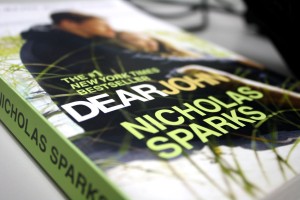By Rebecca Fowler
Staff Writer
“What does it mean to truly love another?” This is the question posed in Nicholas Sparks’ praised novel Dear John, recently made into a film which is now No.1 in America.
Dear John is an excellent piece of fiction, strewn with “aww” moments from beginning to end and filled with all the right characters to make girls fall in love with it. Like The Notebook and A Walk to Remember, Dear John captures readers with its fairytale romanticism and modern-day challenges.

The novel falls into place with Sparks’ other works—where it lacks in depth, reality and originality it makes up for in its ability to appeal to women in a story about family and love. In its attempt to answer the age-old question about true love, the book follows the story of John Tyree, a tough soldier who was raised by a single, reserved father.
As one would expect from a romance, the story is focused mainly on John’s journey of falling head-over-heels for the loveable Savannah Curtis during her spring break trip to his hometown on the beach. But, unlike most sappy love stories, it is also very much about John’s relationship with his father.
The film is even more so. The character of Mr. Tyree is well portrayed by Richard Jenkins, and Channing Tatum as John could not have been a better choice. Their sweet connection through collecting rare coins is extremely powerful and unique in the book, and it is just as good to see acted out on the big screen.
Though most films based off of novels are disappointing when it comes to expressing the depth of characters, Dear John does not fall short—mainly because the characters are not extravagantly deep in the book to begin with. The 276-page novel moves along quickly, making it easier to turn into an hour and 50-minute movie.
As most book-based films do, Dear John changes some minor details to make it simpler for the audience, such as making a little boy one of the characters’ son instead of his brother.
However, a rather large detail that is vastly changed is the ending of the film. With the way it is altered, viewers are left with a completely different feeling than Sparks desired his readers to come away with after reading the novel. Though it may have been a good choice considering the different effect films have compared to books, the novel’s ending was much more powerful and was written with a specific purpose in mind.
For those who simply cannot stand movies that do not match up 100 percent with their novel counterparts, Dear John will be a letdown. It is an excellent film with loveable characters, strong messages on the deep bond of family and, of course, that passionate romance that makes chick-flicks so appealing. But when it comes to a straightforward enactment of the novel, Dear John is not that movie.
For Nicholas Sparks’ film-lovers, however, Dear John is a win. It will make you smile, it will make you cry and it will definitely leave you wanting more.








